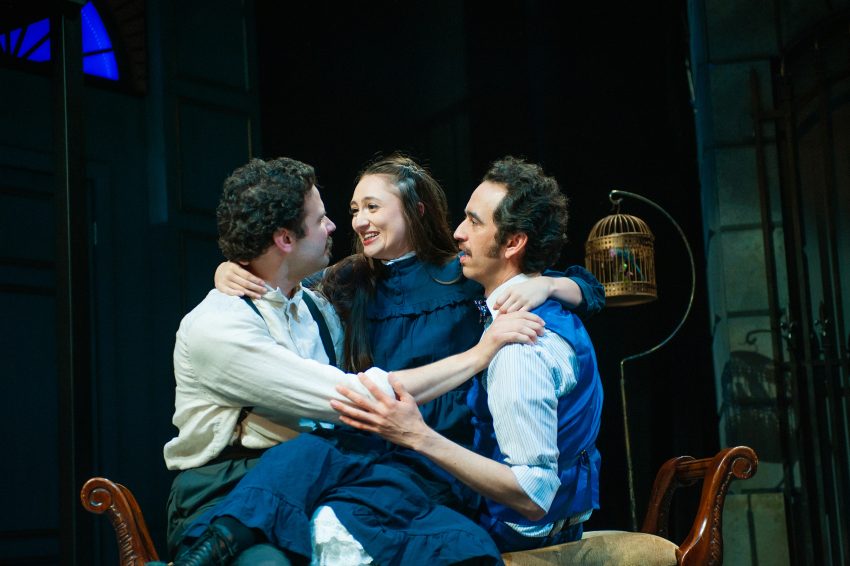
“My Fair Lady”: Lush Update of a Musical Masterpiece—at SF Playhouse
Bill English Spotlights Woman’s Liberation & Sexual Shenanigans
by Lynne Stevens
In Director Bill English’s smart new “My Fair Lady,” a “street urchin,” a phonetics professor, and a military man make up a cozy menage à trois. Based on Bernard Shaw’s 1912 “Pygmalion,” Lerner and Loewe’s masterpiece bursts into fresh life at S.F. Playhouse.
When Eliza Doolittle (lively Jillian A. Smith) speaks in her brash Cockney accent, she yowls like a cat, betraying her origins. Realizing that her accent is keeping her in poverty, Eliza wishes for a better life. She sings, “Wouldn’t It Be Loverly?”—as she dreams of owning her own flower shop.
Once she persuades Prof. Henry Higgins (wonderful Adam Magill) to teach her to speak properly, she works hard to pronounce difficult vowels over and over. Her long-A sounds like ieeee! Exhausted by Higgins’ strict lessons, she persists in aiming for an independent life. Smith’s Eliza is a force of Nature!
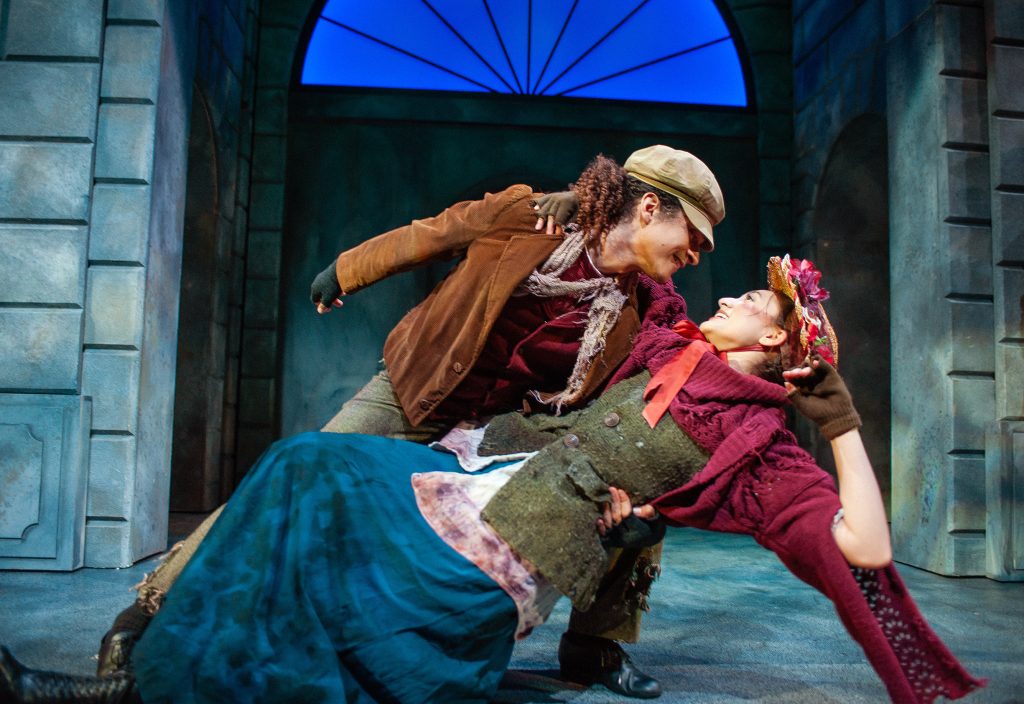
But arrogant Higgins discounts Eliza as a mere beggar, calling her “a squashed cabbage leaf.” Higgins looks down on her as a mere girl who sells flowers in the streets. Magill’s Higgins is just full of himself, a lonely mad genius.
Higgins’ buddy Colonel Pickering (subtle Brady Morales-Woolery) tries to get Higgins to lighten up. While Higgins asserts that men are superior to women, Pickering empathizes with Eliza. And while Higgins may enjoy Pickering’s company, Pickering is doing the admiring. Pickering, a closeted gay military man, looks longingly at Higgins, with a pregnant pause, in a delicious moment. Pickering makes up the third leg of their menage à trois.
The idea for re-making Eliza’s speech starts as a pompous bet between Higgins and Pickering. Director English has their interactions linger just that little bit longer. The pat on the back, the strong hug, and sustained look suggest an unspoken connection.
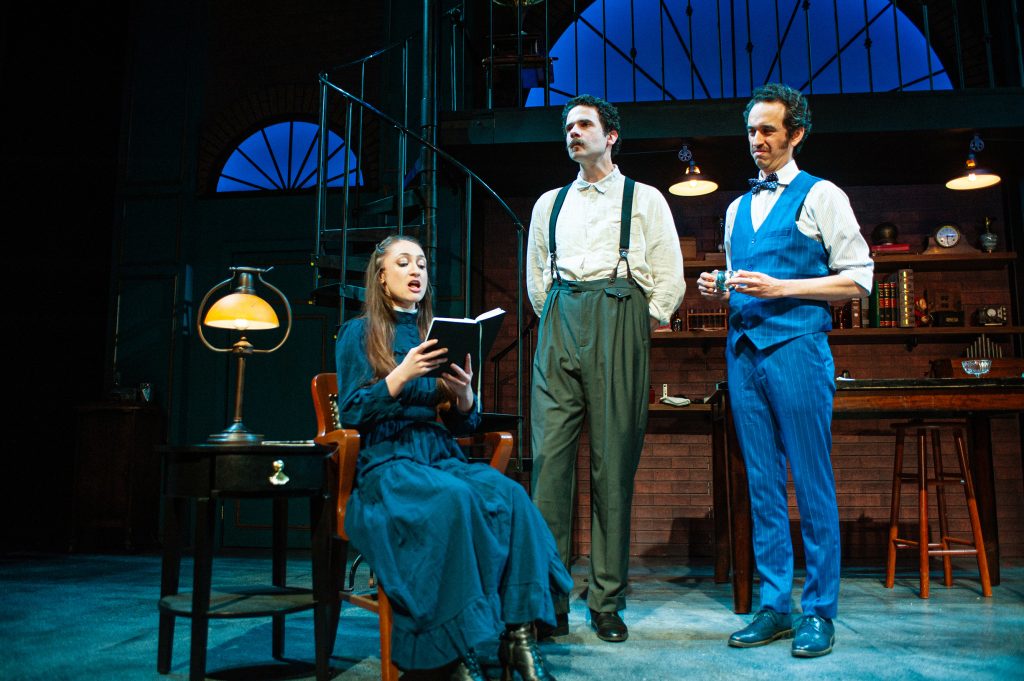
As designer Nina Ball’s superb, detailed set revolves, it reveals the stone walled flower market outside Convent Garden; then Higgins’s house and study, an imposing facade “on the street where you live.” It’s almost like turning the pages of a book as the stage turns. The craftsmanship is evident in every setting from the street to the winding iron staircase in Higgins’ upper room.
As her garbageman Dad, Alfred P. Doolittle, irrepressible Jomar Tagatac hits the heights of comedy, dance, and invention. Tagatec’s Doolittle has hopes that “With A Little Bit of Luck,” he can escape his demeaning job:
DOOLITTLE
A man was made to help support his children
Which is the right and proper thing to do
A man was made to help support his children, but
With a little bit of luck, with a little bit of luck
They’ll go out and start supporting you.
But Eliza is having none of her funny father’s antics. She has no intention of supporting any man who refuses to pull his weight.
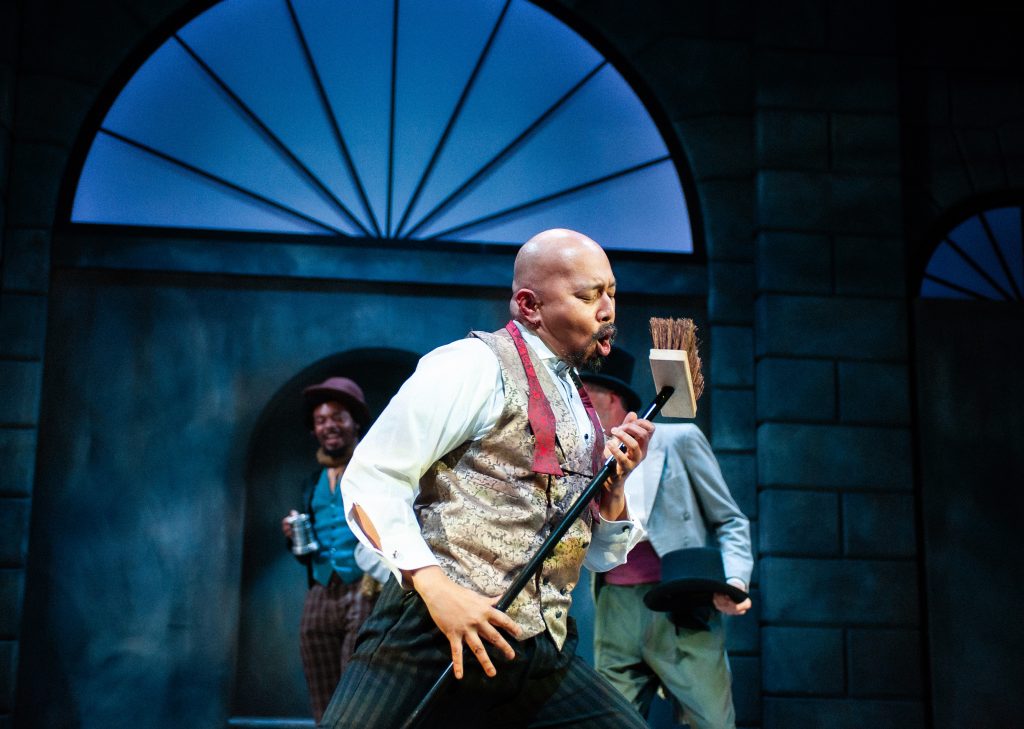
When Higgins sings to his loyal friend: “I’m an Ordinary Man,” we know he’s really a hypocrite. Higgins’ hesitation tells the real story:
HIGGINS:
… But, (long pause) let a woman in your life
And your serenity is through
She’ll redecorate your home, from the cellar to the dome
Then go on to the enthralling fun of overhauling you.
Prof. Higgins spouts clichés about women, marking his misogyny.
Eliza, cleaned up by sharp-edged housekeeper Mrs. Pearce (pitch-perfect Heather Orth), is soon ensconced in the Higgins household. As Mrs. Pearce, Heather Orth has great comic moments, and a wonderful voice, too!
As Freddy Eynsford-Hill, delightful Nicholas Tabora swoons over Eliza’s transformation. He’s so gob-smacked, he stakes out her house, singing, “On the Street Where You Live, ” expressing old-fashioned, romantic ideas about women.
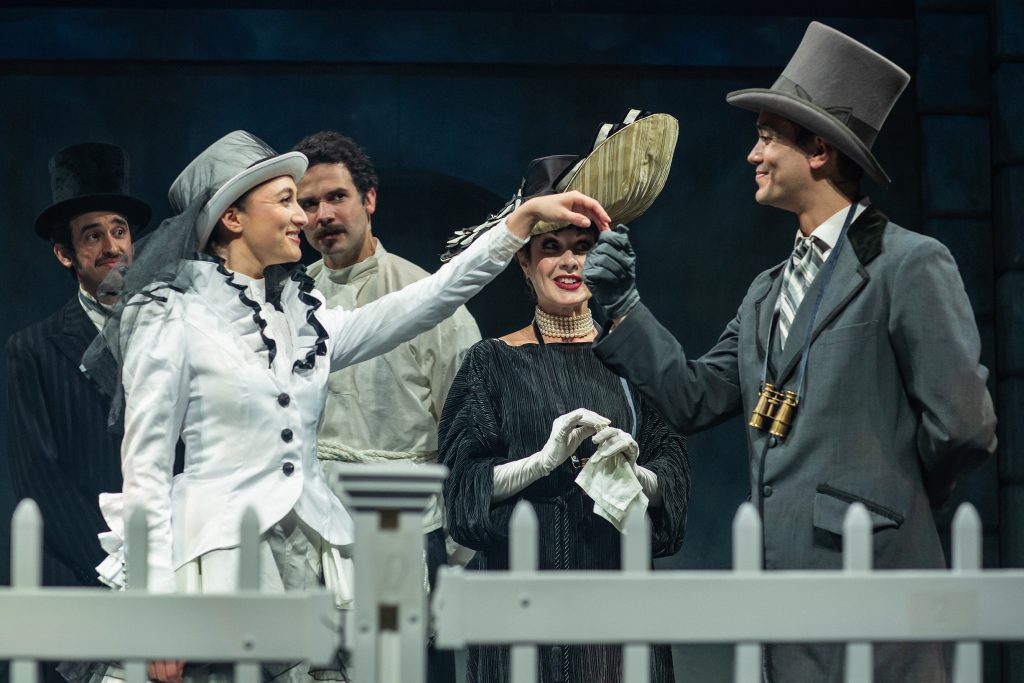
The progression of songs reveals Eliza’s growing confidence and her new-found role as an independent woman. In “Without You,” she cuts Higgins down to size.
The chorus is excellent and full of energy. Lerner’s witty lyrics and Loewe’s heavenly music bring delighted anticipation of each line. You won’t find a better musical interpretation of Bernard Shaw’s “Pygmalion” anywhere.
Shaw must be happy that SF Playhouse is presenting the real deal.
“My Fair Lady” –book/lyrics by Alan Jay Lerner, music by Frederick Loewe, original production directed by Moss Hart, adapted from George Bernard Shaw’s “Pygmalion” and Gabriel Pascal’s motion picture Pygmalion.
Directed by Bill English, music direction by Dave Dobrusky, choreography by Nicole Helfer, scenic design by Nina Ball, costumes by Abra Berman, lighting by Michael Oesch, and sound by James Ard.
Info: sfplayhouse.org – to Sept. 13, 2025.
Cast: Jillian A. Smith, Adam Magill, Brady Morale-Woolery, Nicholas Tabora, Jomar Tagatac, Heather Orth, Jill Slyter, Chachi Delgado, Andy Collins, Jurä Davis, Julio Chavez, Jill Jacobs, Kareem Jenkins, BrieAnne Alisa Martin, and Dian Meechai.
Banner photo: Professor Higgins (Adam Magill), Eliza (Jillian A. Smith), and Colonel Pickering (Brady Morales-Woolery) celebrate. Photos: Jessica Palopoli